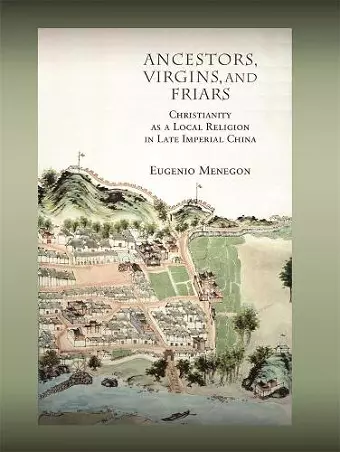Ancestors, Virgins, and Friars
Christianity as a Local Religion in Late Imperial China
Format:Hardback
Publisher:Harvard University, Asia Center
Published:30th Jun '10
Should be back in stock very soon

"In this elegant and erudite book Menegon uncovers the lost history of a four-hundred-year-old Catholic community in China, showing brilliantly how Christianity has become localized, how it has become Chinese, how it has become part of local life. The book convincingly undermines the widespread notion that what is most important about Christianity in China is its foreignness. It needs to be read not only by scholars of Christianity but also by all scholars of late imperial China, who ignore Christianity at the expense of a full understanding of religious life. As the number of Christians grows explosively in China today, this book offers an invaluable account of the past and useful material for reflecting on the future." --Michael Szonyi, Harvard University "Combining a thorough mastery of Spanish missionary records and profound knowledge of Chinese sites and their sources, this book sets a new standard for the study of Catholic missions and cultural encounter in Late Imperial China." --R. Po-chia Hsia, The Pennsylvania State University "In this rich reconstruction of the Dominican mission to Fujian, Menegon exposes the delicate maneuverings by which ordinary people managed a major cultural divide. His intimate portrait shows us how, in one community, Christianity became an indigenous, and resilient, Chinese religion four centuries ago." --Timothy Brook, University of British Columbia
In the 16th century, European missionaries brought a foreign religion to China. Converts transformed this religion into a local one. Focusing on the still-active Catholic communities of Fuan county in Fujian, this project’s implications extend to the fields of religious and social history and early modern history of global intercultural relations.
Christianity is often praised as an agent of Chinese modernization or damned as a form of cultural and religious imperialism. In both cases, Christianity’s foreignness and the social isolation of converts have dominated this debate. Eugenio Menegon uncovers another story. In the sixteenth century, European missionaries brought a foreign and global religion to China. Converts then transformed this new religion into a local one over the course of the next three centuries.
Focusing on the still-active Catholic communities of Fuan county in northeast Fujian, this project addresses three main questions. Why did people convert? How did converts and missionaries transform a global and foreign religion into a local religion? What does Christianity’s localization in Fuan tell us about the relationship between late imperial Chinese society and religion?
Based on an impressive array of sources from Asia and Europe, this pathbreaking book reframes our understanding of Christian missions in Chinese-Western relations. The study’s implications extend beyond the issue of Christianity in China to the wider fields of religious and social history and the early modern history of global intercultural relations. The book suggests that Christianity became part of a preexisting pluralistic, local religious space, and argues that we have so far underestimated late imperial society’s tolerance for “heterodoxy.” The view from Fuan offers an original account of how a locality created its own religious culture in Ming-Qing China within a context both global and local, and illuminates the historical dynamics contributing to the remarkable growth of Christian communities in present-day China.
In this rich reconstruction of the Dominican mission to Fujian, Menegon exposes the delicate maneuverings by which ordinary people managed a major cultural divide. His intimate portrait shows us how, in one community, Christianity became an indigenous, and resilient, Chinese religion four centuries ago. -- Timothy Brook, University of British Columbia
Combining a thorough mastery of Spanish missionary records and profound knowledge of Chinese sites and their sources, this book sets a new standard for the study of Catholic missions and cultural encounter in Late Imperial China. -- R. Po-chia Hsia, Pennsylvania State University
In this elegant and erudite book, Menegon uncovers the lost history of a four-hundred-year-old Catholic community in China, showing brilliantly how Christianity has become localized, how it has become Chinese, how it has become part of local life. The book convincingly undermines the widespread notion that what is most important about Christianity in China is its foreignness. It needs to be read not only by scholars of Christianity but also by all scholars of late imperial China, who ignore Christianity at the expense of a full understanding of religious life. As the number of Christians grows explosively in China today, this book offers an invaluable account of the past and useful material for reflecting on the future. -- Michael Szonyi, Harvard University
- Winner of Joseph Levenson Book Prize 2011
- Nominated for John K. Fairbank Prize in East Asian History 2010
- Nominated for John Gilmary Shea Prize 2010
ISBN: 9780674035966
Dimensions: unknown
Weight: unknown
450 pages